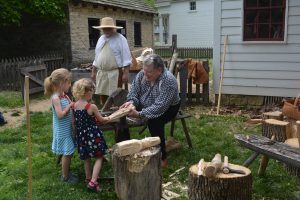Why We Homeschool Year-Round…Or Not
As I mentioned in this blog post, the reasons my family homeschools are the three F’s: freedom, flexibility, and family time. All three factor into homeschool scheduling. After what you study, the next biggest consideration is when you study. Our first year of homeschooling, we did the classic “school at home” set-up, with huge, brightly colored educational posters on the wall, the giant classroom calendar, individual desks…and we followed the public school schedule, both during the week and during the year. We “did school” during typical school hours and took Saturdays and Sundays off. We also took similar yearly breaks and three months off for summer. It didn’t go well for our family, and since then, we’ve schooled all year long.
Why do year-round homeschooling? Here are a few reasons we do.
1) Shorter “school” days
If we’re able to spread out material over a greater length of time, we’re less likely to rush, and we’re able to have shorter periods of work. This flexibility is also great when, due to parent work schedules, a family needs to “do school” 3-4 days a week rather than the typical 5-day schedule; there are still enough days to cover the same amount of material.
2) Take breaks when they’re needed, rather than at arbitrary times
If we’re all tired, or someone gets sick, or it’s someone’s birthday, we can take time off without worrying about hitting deadlines. If we want to take time off for the kids to attend a cool camp or workshop, we can do that, too. We can also vacation during the off season, saving money and avoiding crowds.
3) No “summer slide”
By continuing academics throughout the summer months, we avoid the period of review that public schools take in the fall with their returning students.
4) Keep momentum going
If we’re doing academics twelve months out of the year, rather than nine, that’s a lot of extra time that can be spent learning. For example, schooling year-round has enabled my once math-averse student to work through difficulties and get ahead of public school peers in that subject.
5) Activities are less weather-dependent
Who hasn’t looked outside on an unseasonably warm and beautiful fall or winter day and longed to be in nature, rather than sitting behind a desk? When you school year-round, you can choose to spend the stormy days or blistering-hot days inside doing projects, and head outside to explore, go to the beach, or do an outdoor activity when the weather is favorable.
Just because year-round homeschooling has worked best for us doesn’t mean it’s what’s best for everyone.
As with all things homeschooling, the lifestyle tailors itself to each individual child’s (and family’s) needs. For some, taking summers off from school make the most sense. Some examples of why you might prefer to take summers off include:
1) Children in public school and homeschool
We have a couple friends in our co-op who have siblings in public school. It’s far easier for parents to coordinate vacations and activities when their kids are on similar schedules.

2) Children who want to spend summer days with their public school friends
It can be hard for kids to be sitting at a computer, typing out a history paper, while listening to neighbor kids laughing as they ride bikes in the street or run through backyard sprinklers. Whether your kids have public school friends in the neighborhood or through sports or other activities, summer can be prime time for them to bond.
3) Family vacations
It’s likely that not everyone in your extended family homeschools. Taking summers off gives your kids the opportunity to bond with cousins, get to know extended family, take trips, and attend reunions together.
4) Camps, workshops, and other opportunities
Art, drama, music, outdoor survival, robotics, STEM, history, sports–summer is primetime for camps! Homeschool families that take summers off from regular academics have weeks and weeks to allow their kids to explore interests and make new friends. We do year-round homeschooling, but we still always take a couple weeks off in the summer to allow the kids time to explore their passions in-depth with other kids. Last summer, they did a two-week theater camp. This summer, they’re doing an outdoor survival camp and a colonial history camp.
5) Time to rest, recharge, and plan for next year
Sometimes…you all just need an extended break. Your kids need a solid break to explore the creek in the backyard and build a fort. You may want to read a non-education book and get your house in order or redecorate. I know a lot of parents who also take the summer to plan out their curriculum for next year, decide on unit studies, and pick field trips.
Education isn’t one-size-fits-all. When it comes to what and when you study, you decide. And that’s awesome.
Elizabeth Caraway has homeschooled for eight years. Before moving to Virginia, she lived in Ohio, where she served as the homeschool outreach program founder and director for a local nursing home for four years and helped facilitate another local group of 500+ homeschoolers. She has also taught homeschool group French classes and participated in homeschool cooperatives. Liz is a graduate of the U.S. Air Force Academy, where she later taught in the Dept of English, and the University of Delaware, where she earned an M.A. in English Literature. An Air Force veteran, Liz enjoys acrylic painting, time in nature, and travel. She lives in Sterling, VA, with her two daughters and computer nerd husband.
Opinions expressed by individual writers in this blog do not necessarily reflect the views of the Board of Directors of The Organization of Virginia Homeschoolers, nor do they represent an official position of VaHomeschoolers. Writers’ views are their own, and readers are encouraged to research and explore homeschooling issues to their own satisfaction.
